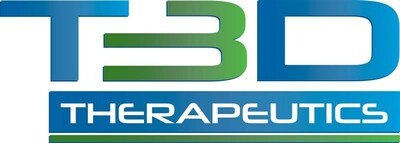New cognition/function and extensive plasma biomarker results of T3D-959 treatment from the Phase 2 PIONEER trial, in a modified intent-to treat population of mild to moderate Alzheimer's patients will be presented at the upcoming Alzheimer's Association International Conference (AAIC) in Philadelphia, PA from July 28 to August 1.
T3D-959 is a novel, orally delivered, once-a-day, small molecule drug candidate, designed to activate two nuclear receptors regulating brain glucose energy and lipid metabolism to improve brain health and function.
RESEARCH TRIANGLE PARK, N.C., July 24, 2024 /PRNewswire/ -- T3D Therapeutics, Inc., a clinical stage drug development company engaged in the development of a new orally administered treatment for Alzheimer's disease (AD), today announced that CEO, John Didsbury, will be presenting new Phase 2 results in a modified intent-to-treat population of mild to moderate Alzheimer's patients at AAIC. The poster presentation will take place on Sunday, July 28th in Philadelphia, PA.
Presentation Details:
Title: Phase 2 PIONEER Trial of Oral T3D-959 for the Treatment of Patients Diagnosed with Mild-to-Moderate Alzheimer's Disease: New Results in a Modified Intent-to-Treat Population
Session: Developing Topics: Drug Development
Poster Number: Sunday-798
Abstract Number: 95625
Date/Time: July 28, 2024, 8:00am-4:15pm (ET)
Location: Pennsylvania Convention Center, Exhibit Hall (Hall BC)
Presenter, John Didsbury states, "AD is a disease that encompasses a plethora of neurodegenerative 'triggers' including beta amyloid plaques, tau neurofibrillary bundles, oxidative stress, neuroinflammation and neurotransmitter deficits. Altered glucose and lipid brain metabolism is at its core. Improving brain metabolism can impact these neurodegenerative triggers, including reducing amyloid plaque burden. Current AD drug development is highly focused on plaque reduction, but recently-marketed therapies are not ideal in terms of safety and delivery. The novel mechanism of action, oral once-a-day administration, and safety profile of T3D-959 offers the potential to address the deficiencies of anti-plaque antibodies."
About T3D-959: T3D-959, a small molecule, delivered orally once daily, is a brain-penetrating PPAR delta/gamma dual nuclear receptor agonist designed to improve both glucose and lipid metabolism dysfunctions present in AD and other neurodegenerative disorders.
About the Study: The Phase 2 PIONEER study (Prospective therapy to Inhibit and Overcome Alzheimer's Disease Neurodegeneration via Brain EnErgetics and Metabolism Restoration) was a double-blind, placebo-controlled, parallel-group Phase 2 safety and efficacy study that enrolled 250 adults with mild-to-moderate Alzheimer's disease (MMSE 14-26). PIONEER was designed to assess the safety, tolerability, and effectiveness of T3D-959 in the treatment of Alzheimer's disease. T3D-959 was administered orally once daily over a 24-week dosing period. Subjects received one of three different doses of T3D-959 (15mg, 30mg, or 45mg) or a placebo. To learn more about this study please visit www.clinicaltrials.gov and reference study number NCT04251182.
PIONEER is supported by the National Institute on Aging, part of the National Institutes of Health, under award number R01AG061122 and by the Alzheimer's Association's Part the Cloud Gates Partnership Grant Program.
About T3D Therapeutics, Inc.: T3D Therapeutics, Inc. is a privately held, Research Triangle Park, NC-based company. The Company has an exclusive license to T3D-959, its lead product candidate, and a platform of structurally related molecules. T3D Therapeutics' mission is to develop and commercialize T3D-959 for the treatment of Alzheimer's disease.
Forward-Looking Statements: Statements contained in this release that are not statements of historical fact are forward-looking statements, including those statements relating to the Company's expectations regarding clinical studies and developments, and the future potential of its product candidates, including T3D-959, and other statements that are predictive in nature or that depend upon or refer to future events or conditions. Without limiting the generality of the foregoing, words such as "may," "will," "expect," "believe," "anticipate," "intend," "could," "estimate" or "continue" are intended to identify forward-looking statements. Readers are cautioned that certain important risks and uncertainties, and assumptions, which if they do not materialize or prove incorrect, may affect the Company's actual results and could cause such results to differ materially from any forward-looking statements which may be made in this release or which are otherwise made by or on behalf of the Company. Factors which may affect the Company's results include, but are not limited to, uncertainties and/or unexpected results related to research and development and clinical testing, the timing, costs and uncertainty of obtaining any required regulatory approvals, changes in the regulatory landscape, uncertainties related to obtaining additional capital as needed to meet the Company's needs on acceptable terms, or at all, the absence of any guarantee of product demand, market acceptance or competitive advantage for any of the Company's product candidates, if approved, and certain trade, legal, social and economic risks. Any forward-looking statement in this release speaks only as of the date on which it is made, and the Company assumes no obligation to update or revise any such forward-looking statement.
For more information visit http://www.t3dtherapeutics.com/.
CONTACT:
John Didsbury, Ph.D., CEO
T3D Therapeutics, Inc.
1-919-237-4897
Email: info (at) t3dtherapeutics (dot) com
![]() View original content to download multimedia:https://www.prnewswire.com/news-releases/a-novel-way-to-reduce-alzheimers-amyloid-plaque-burden-phase-2-clinical-trial-results-of-t3d-959-to-be-presented-by-t3d-therapeutics-at-aaic-302203467.html
View original content to download multimedia:https://www.prnewswire.com/news-releases/a-novel-way-to-reduce-alzheimers-amyloid-plaque-burden-phase-2-clinical-trial-results-of-t3d-959-to-be-presented-by-t3d-therapeutics-at-aaic-302203467.html
SOURCE T3D Therapeutics, Inc.






